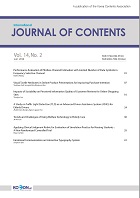- 권한신청
- P-ISSN1738-6764
- E-ISSN2093-7504
- KCI
 ISSN : 1738-6764
ISSN : 1738-6764
Extending the Theory of Intercultural Public Relations: Influence of Power in the Intersection of Cultural Identity, Social Capital and Social Control for Korean American professionals
Abstract
Interviews with 17 Korean American professionals living in Korea revealed the relationship between their status, cultural identities, social capital, and conflicts that arise between their understanding of American and Korean social norms. The findings indicate that social capital for Korean Americans in Korea largely comprises of their English community in Korea and the Seoul Global Center; and that their access to social capital in the Korean society, in general, is limited. As result of limited availability and accessibility of social capital, with a sense of superiority, they maintained their American identity. In terms of social control, their lack of motivation to adopt and follow Korean social norms, as well as them being from the U.S., limited changes occurred in their cultural identity. Extending previous research on the Theory of Intercultural Public Relations, the public’s power allows them to maintain their cultural identity, which in turn, effect their communication process. Implications of these findings, as well as suggestions for future study, are discussed.
- keywords
- Diversity in public relations, Korean Americans in Korea, cultural identity, social capital, social control
- 다운로드 수
- 조회수
- 0KCI 피인용수
- 0WOS 피인용수

